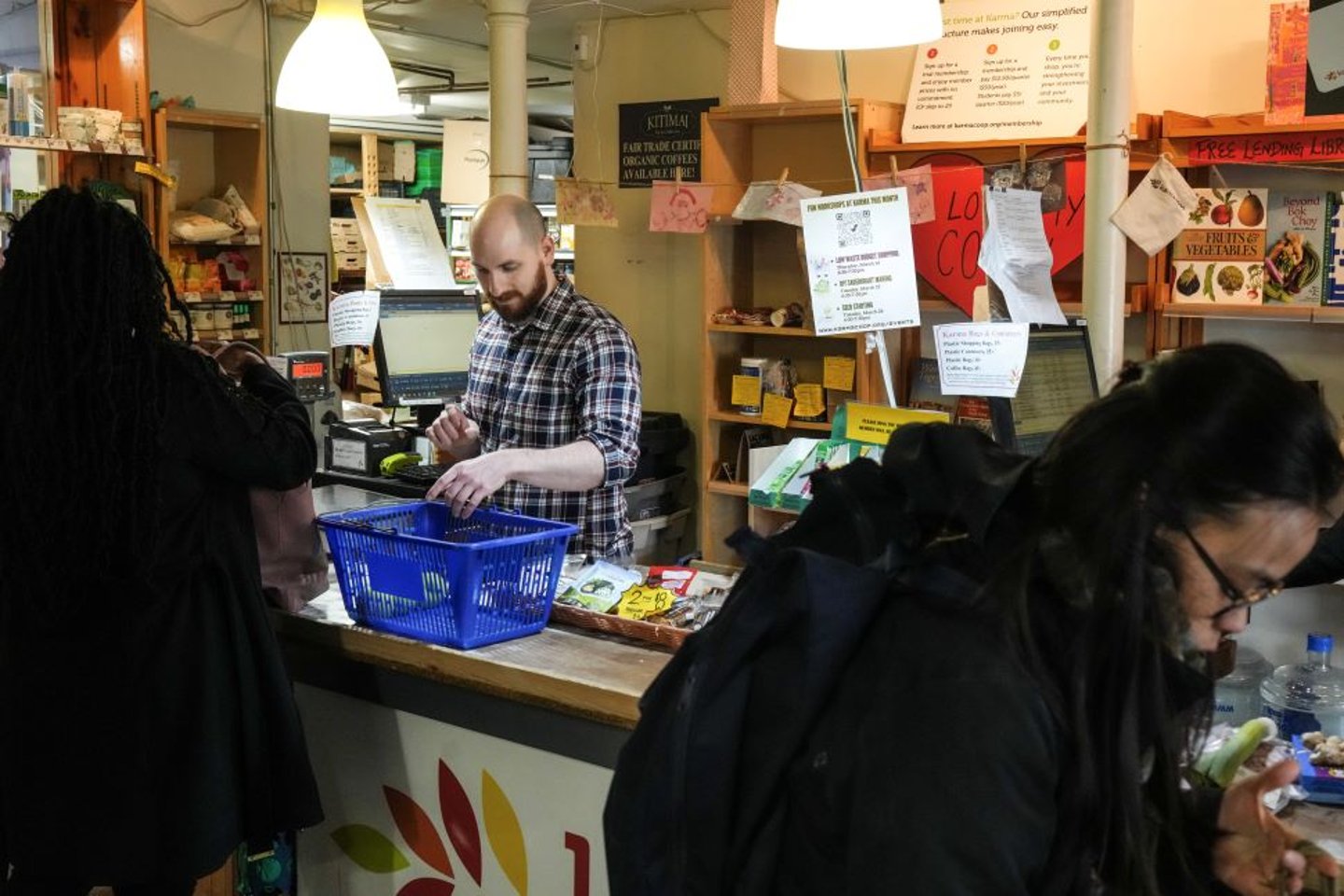Grocery co-ops an alternative to corporate grocers amid anger, mistrust: experts
These days, Bruce Woodrow gets most of his groceries at one of two places: Costco, and a small grocery co-operative nestled in an alley in the heart of Toronto.
The retired lawyer — along with many Canadians over the past couple of years — had been growing more concerned with the grocery industry and the profits it was turning as food prices climbed.
Woodrow joined Karma Co-op as a member last spring and now volunteers on the store's finance committee.
"The money, I know, is going to make an operation that I believe in better," said Woodrow.
Co-operatives are found in many forms, from agricultural co-ops to grocery stores, gas stations and car-shares. Their exact business models vary, but what they have in common is that they are owned by their members, who have a share in the organization and a say in how it runs.
About 70% of co-ops are owned by their customers, said Daniel Brunette, senior director of external affairs at Co-operatives and Mutuals Canada. Other co-ops are owned by producers, such as farmers or artists; workers; or multiple stakeholders.
While there's been a steady increase in consumer-owned grocery co-ops in the U.S. in recent years, Canada hasn't seen the same kind of uptick, said Jon Steinman, author of "Grocery Story: The Promise of Food Co-ops in the Age of Grocery Giants."
But in some Canadian communities, co-ops are already part of everyday life.
Steinman himself is a member of seven different co-ops — the grocery store Kootenay Co-op in Nelson, B.C., a credit union, a radio station, a carshare, a grain mill, a gas station that also owns a pub, and an outdoor apparel retailer.
Co-ops are popular in Nelson and the surrounding area, he said, in part because it’s a relatively remote region — a common similarity among co-ops. Often co-ops are formed out of necessity.
Single-location co-ops like Karma are different from Federated Co-operatives Ltd. in Western Canada, usually known simply as Co-op.
A federation of independent co-ops with more than 1,500 locations across its network, its retail locations include food stores, gas bars and convenience stores, car washes and liquor outlets.
Each of the locations in the network is a co-op, and then that co-op is a part owner of the federation, which functions like a wholesaler or supplier and provides business services like marketing and technology, Steinman said.
Many grocery co-ops like Karma were formed in the late 1960s and early 1970s, said Steinman.
Karma was formed amid a wider movement spurred on by distrust of large corporations, general manager Zachary Weingarten said.
"Even back in 1972, folks were frustrated with the largest supermarkets and the consolidation they were seeing in the industry, putting the smaller stores out of business," he said. "Fifty-two years later, we’re still facing a lot of the same issues."
The co-op focuses on local, organic and ethically produced foods, with many products available in bulk for zero-waste shoppers. Members get an extra discount if they work a few hours each month, and they have a vote on how the co-op is run.
The Kootenay Co-op, where Steinman is a member, was founded a few years after Karma. It’s signed up around 700 new members annually for the last few years, said marketing and sales manager Amanda Verigin.
Any profits the grocery makes are reinvested into employee pay and benefits, store improvements, donations and credits for members.
"The more profits that we get, that's more that we can give back to the community," Verigin said.
READ: Borderland Co-op to build a convenience store and gas bar in Kipling, Saskatchewan
Inflation put the grocery industry under a microscope, making people think more about where their money goes, she said. She thinks co-op membership can help people feel like they have some power over larger forces like climate change or corporate consolidation.
"I think co-ops really give people a sense of hope ... maybe we can't fix this on a grand scale, but we can fix it in our community."
Almost two-thirds of co-ops are for-profit, said Brunette, but it’s what co-ops do with those profits that differentiates them from conventional businesses.
In a 2020 Abacus Data poll for Co-operatives and Mutuals Canada, 14% of consumer surveyed said they were members of a retail co-operative, including grocery stores.
But many Canadians don’t understand the co-op business model, the study suggested.
In a time of economic and political unease tied to climate change, inequality and a feeling of helplessness, the study said co-operatives could offer Canadians a solution. There’s usually more interest in co-ops when the economy is doing poorly, said Brunette, or when a specific system is in crisis.
So in theory, the current landscape in Canada — higher prices, frustration with corporations — could make more people interested in joining or starting a co-op, he said.
This report by The Canadian Press was first published May 3, 2024.



